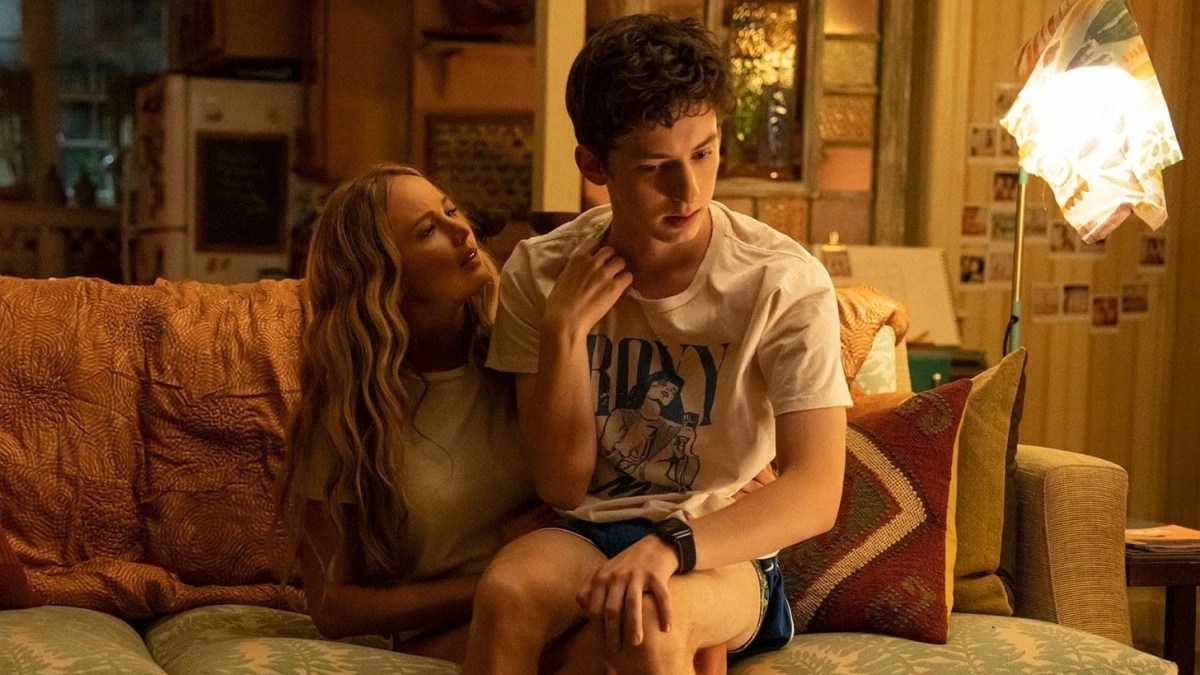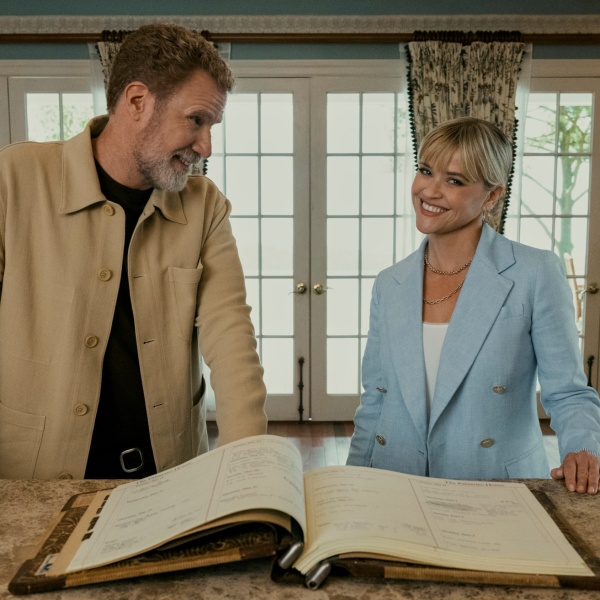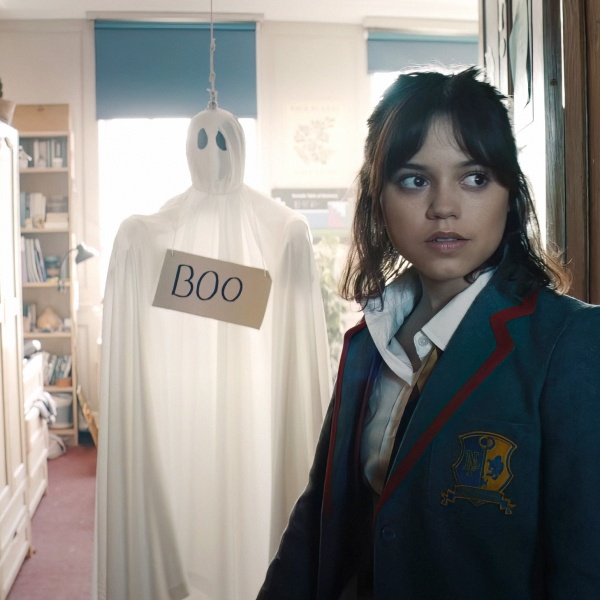
As someone old enough to remember when the prospect of seeing people hump each other on screen was generally considered to be more of a feature of the film-going experience than a bug, I grew bored of social media’s never-ending sex scene discourse long before 2023 began. We all know the reasons why movies aren’t as carnal as they used to be (e.g. the dominance of four-quadrant corporate product, the resultant disappearance of dramas, rom-coms, and erotic thrillers, the fact that chiseled franchise stars like Chris Pratt have all the sex appeal of a dry potato, etc.), just as we’re all familiar with the theories about why younger audiences who came of age on the internet might see that as a good thing (e.g. the widespread belief that social isolation and the emergent focus on sexual abuse have made desire seem tantamount to violence). These self-evident truths have been the subject of a million quote-RTs over the last several years, and they will continue to haunt our cursed “For You” tabs until the hellscape formally known as Twitter finally implodes from the gravity of its owner’s eternal virgin energy.
The only thing that changed this year is that the movies themselves started to catch up with the conversation around them, and some of the pushback was glorious (even when it was incidental). The unapologetically horny “Poor Things” found joy and liberation in Bella Baxter’s “furious jumping,” “Passages” delighted Sundance with a glimpse at Paddington’s butt, and “Beau Is Afraid” offered the nightmarish parody of a momma’s boy who’s been afraid of sex for so long that his testicles have swollen to the size of grapefruits.
In a year whose two biggest films were about a woman without a vagina and a troubled PILF (Physicist I’d…) who can only come when Florence Pugh reads him the Bhagavad Gita, even the does it offend you, yeah? provocations of Emerald Fennell’s “Saltburn” felt like a breath of fresh air. It’s hard to give too much credit to a movie that couldn’t separate desire from deviancy, but in a desert of onscreen flesh, even Jacob Elordi’s dirty bath water might seem like an oasis.
Elsewhere, “No Hard Feelings” and “Anyone But You” tried to revive the rom-com with R-rated romps that normalized sex (even if both films used perfect bodies to undercut the scopophilic pleasure of watching them, the former to particularly hilarious effect). “Rotting in the Sun” put so many flaccid dicks on screen I almost confused it for an episode of “Real Time with Bill Maher.” And “Napoleon” reminded us that even the Great Men of history were just stupid little animals behind closed doors. Few of these movies allowed viewers to indulge in the base delight of looking at beautiful flesh, but together they suggested that while sex on screen may not be as prevalent as it used to be, it might be more varied and interesting than we give it credit for.
Or maybe I’m grasping at straws? In lieu of a unifying theory about the year in film sex, I’d like to invite some of my fellow IndieWire staffers to weigh in with their thoughts on what they saw this year. What role do you guys think the movies of 2023 played in the great sex-on-screen debate?

CHRISTIAN ZILKO (Weekend Editor): In terms of sheer memorability, I think 2023 was a great year for sex scenes. We weren’t even through the bone-dry January movie season before an Alexander Skarsgard cumshot was thrust upon us in “Infinity Pool.” And it’s hard to imagine anyone watching “Beau Is Afraid” without some of the nightmarishly Oedipal imagery burning itself into their brain. We even watched two brothers blow each other’s backs out in what has to be one of lewdest gay incest scenes in theatre history in “Dicks: The Musical.” And I haven’t begun to parse through my confusion over watching Emma Stone play what amounts to a sexually ravenous infant with a recently deceased adult’s body in “Poor Things.”
Yet for all those shattered taboos, it’s still apparently unreasonable to expect a mainstream studio release starring the hottest movie stars on the planet to feature any good sex. To me, the overarching trend at play is “Everyone Has Lost Their Ability to Be Normal.” I’m personally thrilled that our collective desensitization to shock value has made it possible for creative auteurs with Internet-poisoned brains to ply us with their perverse ideas without too much pearl clutching. But the Faustian bargain that we made to get there was accepting the idea that there has to be something inherently shocking about sex.
It all speaks to the fact that we live in a society that’s as horny as it is sexless. Asking a stranger on a date or having a one-night stand have become daunting activities to the very same people whose Internet connections afford them access to terabytes upon terabytes of the filthiest smut that humanity has ever produced. Couple that with endless discussions about power dynamics at every level of society, and it’s hard to be particularly surprised that every memorable sex scene has to be either a boundary-pushing kinkfest or a chaste fade to black as a hotel room door slowly shuts.
I thoroughly enjoyed both of the year’s biggest films, but on some level they both reflect that sexual ineptitude. A smarter person than me could write the think-piece about how the Barbie doll was the perfect piece of cultural imagery for the 2020s, a decade in which our obsession with appearances and cultivating aesthetic “eras” for ourselves spiked while we simultaneously cut back on leaving the house to socialize with people who could theoretically enjoy those appearances. And I thought the edgelord sex scene in “Oppenheimer” was the glaring flaw in an otherwise perfect movie. Its existence thoroughly debunked the widely accepted notion that anyone capable of making “Tenet” would have to be a skilled, passionate, stallion-like lover. But I can’t fully fault Christopher Nolan for trying to turn his sex scene into a shocking event, because that’s what a sex scene apparently is in 2023.

ALISON FOREMAN (West Coast News and Curation Editor): In a year that saw Steven Soderbergh cough up a disappointingly sexless finale to his Channing Tatum stripper trilogy with “Magic Mike’s Last Dance,” cinema was plagued by a rash of films that didn’t deliver sexiness quite how audiences wanted or expected them to. That was frustrating in a big picture sense, as some titles seemed to get attention (and backlash) for all the wrong reasons — while other movies underdelivered when sex scenes got inevitably overhyped.
It’s practically part of the grand American film tradition to experience sex-related discourse online first, and I was more entertained by the articles discussing the “Oppenheimer” sex scenes than I was any of the actual “Oppenheimer” sex scenes. (Shout out to IndieWire’s Sam Bergeson.) Same goes for “Barbie” and her last-act gynecology visit: a comedic button that I didn’t need analyzed so much as instantaneously meme-d and not overthought.
Later in the year, social media audiences were hugely polarized by “Saltburn” before and after its release. The stylish casting of “Euphoria” star Jacob Elordi was an inevitable part of the film’s sexed-up marketing, but when I finally saw [redacted for spoilers] slurping at that drain, I was surprised to be underwhelmed by a movie I thought would leave my jaw on the floor. I’ll be curious to see if Andrew Scott and Paul Mescal’s spitty sex scenes manage to stir up a similar reaction with “All of Us Strangers” later this month.
I was equally flummoxed by the zany not-really-sex comedy “Bottoms” from Emma Seligman. As a gal who has seen her fair share of horror movies, I was always going to be underwhelmed by the film’s supposedly outrageous violence; but I was shocked to find it featured almost no sex whatsoever — something I found particularly surprising for a film with a plot predicated on the promise of girl-on-girl action and broadly described as teenage “Fight Club” for lesbians. In a comparable vein, Amazon’s adaptation of “Red, White, and Royal Blue” was heavily marketed as a gay rom-com with steamy sex scenes, only to disappoint with a final showing that was accurate to life but not always compelling in a lustful sense.
Meanwhile, “Dicks: The Musical” delivered exactly what was expected from it: a ridiculous, NSFW, gay musical as raunchy as it is rude with a sex scene you have to see to believe. I enjoyed it more than most, but the shrugging A24 extravaganza seemed to vaguely piss off even its more liberal audience members with an audacious, incest-focused premise (and an autonomous CGI pussy living in a purse) that were practically designed to be misunderstood by conservative audiences.
Sex was certainly onscreen more this year, but I can’t say that it felt like Hollywood was more sex positive. A palpable gross-out appeal seemed to follow many of the year’s boundary-pushing, queer releases (TikTok reactions are a particularly dark rabbit hole to fall down), and that carries with it a certain stench of voyeuristic homophobia that’s tough to shake. “Have these people never heard of the ‘Disobedience’ spit?” was a common refrain in my preferred film criticism circles, and a rhetorical question that could just as well be applied to cinema’s awkward embrace of female sexuality throughout the year.
The awkward fumbling that has been so many people attempting to discuss girlhood sexuality as it relates to “Poor Things” feels hugely telling for the predatory misogynistic landscape we live in; but equally demonstrative was the near-universal embrace of Jennifer Lawrence’s more straightforward nude humor scene for “No Hard Feelings.” When women are sexualized in a way that audiences are already familiar with, people seem more willing to defend rather than guffaw. But even something as small as period blood a la “Fair Play” can be enough to generate overblown, pre-release buzz and controversy.
Still, we’ll always have the “Saltburn” grave — and whatever you want to call the dynamic in “May December.” All in all, 2023 felt like a step forward for big sexy swings on the big screen… even if some filmmakers struck out.

SAMANTHA BERGESON (Senior News Editor): I agree with Ali in that, while sex – or rather, nudity as a whole – was more onscreen, I think the type of sex audiences remember (and therefore want to talk about) is the issue. Yes, “Poor Things” was empowering, but the MPAA NC-17 rating for “Passages” was puzzling, the sex scene in question missing the whole “I know it when I see it” infamous Supreme Court description of porn. I didn’t know it because I didn’t see anything that was jaw-dropping in terms of nudity, positions, nothing. Is dissecting and therefore redefining what should be considered “inappropriate” in terms of ratings the new standard for judging what is considered to be boundary-pushing sex onscreen? But then again, who should judge sex at all?
As Natalie Portman coldly says in “May December,” it’s “just what adults do,” so why is there still even a stigma upon seeing The Weeknd jerk off in a Dior dressing room (we’ve all been there) or Alden Ehrenrich eating out Pheobe Dynevor when she’s menstruating—something cis women naturally do?! To me, some of the most interesting sex scenes this year revolved around the build-up to… not having sex at all. Call it foreplay, call it Barry Keoghan humping a mound of dirt in a cemetery, but films like emotional dominatrix drama “Sanctuary” and anxious incel dark comedy “Beau Is Afraid” is what pushed the boundary more than seeing two naked bodies fumble around with a rightfully-employed intimacy coordinator standing by. This year felt like one step closer to seeing more niche sex onscreen in larger-release films, but there is still a puritanical knee-jerk reaction by audiences to ignore or vilify what they don’t understand.
There’s a reason why Ken from “Barbie” is so memorable and leading to Kenough sweatshirts selling out: Shockingly, it’s not just because he essentially started a men’s rights political movement in Barbieland, though. The slew of Kens strumming their guitars on the beach represent the foundation of stereotypical hetero seduction, and that is what sex onscreen this year dismantled — if you’re looking at the right places. Give me more BDSM, show more dangerously convoluted motivations behind seduction, and dive deeper into the taboo — not for shock value but for representation. If “50 Shades of Grey” was a massive literary success turned spoof-like film franchise a decade ago, we really should be seeing more than just menstrual sex, inflamed testicles, and necrophilia onscreen. It’s almost 2024 for fuck’s (pardon the pun) sake: We should be inventing new ways to get off, or turn off the screen all together.





